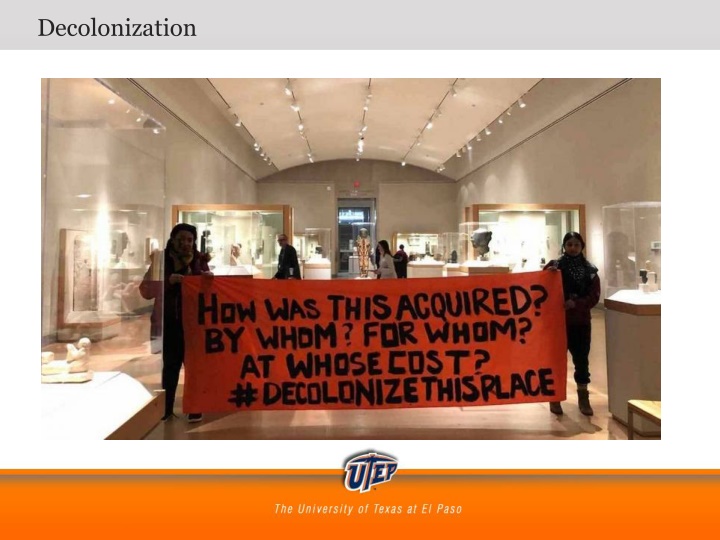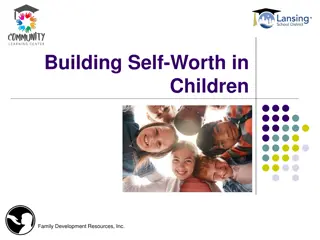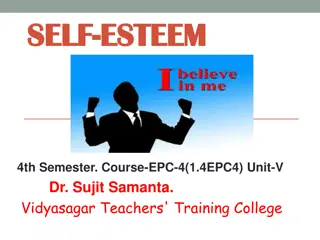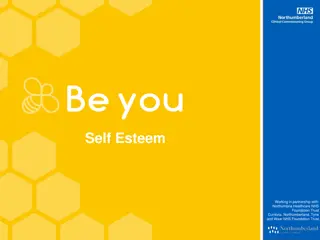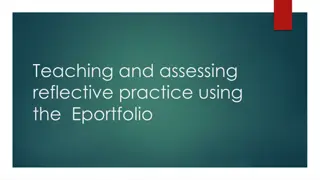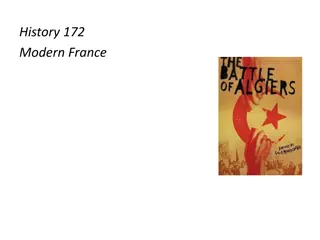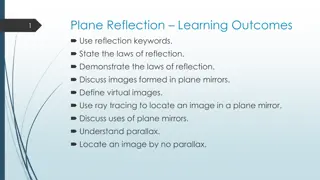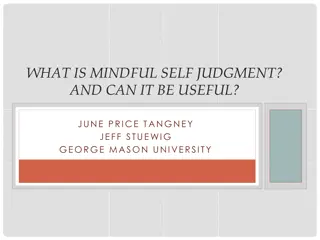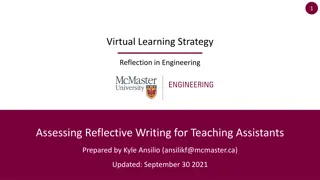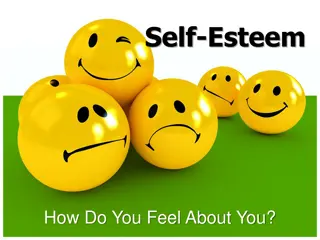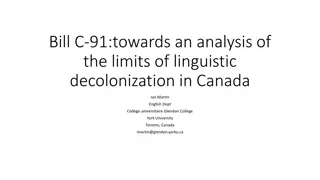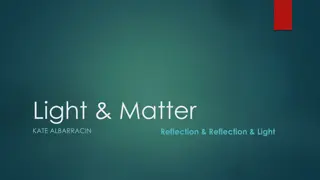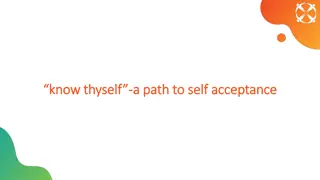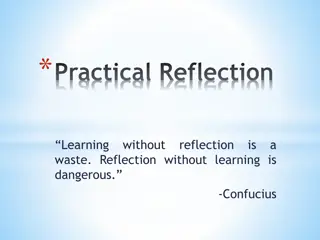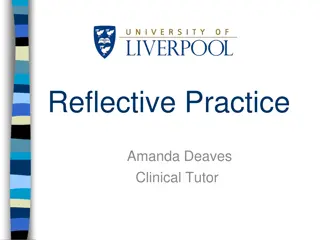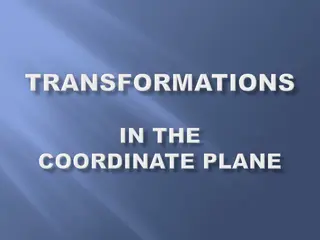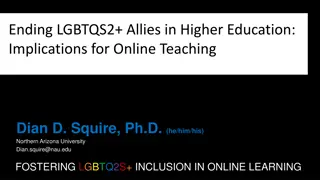Decolonization and Self-Reflection
Decolonization is a multifaceted process encompassing cultural, psychological, political, and economic aspects. It involves reclaiming what was taken, repatriating land, power, and privilege, and resisting colonial forces. To decolonize oneself, it's essential to consider the psychological and spiritual impacts of colonization. Awareness, education, and action are key steps in the decolonization journey, essential for promoting antiracism and inclusion.
Download Presentation

Please find below an Image/Link to download the presentation.
The content on the website is provided AS IS for your information and personal use only. It may not be sold, licensed, or shared on other websites without obtaining consent from the author.If you encounter any issues during the download, it is possible that the publisher has removed the file from their server.
You are allowed to download the files provided on this website for personal or commercial use, subject to the condition that they are used lawfully. All files are the property of their respective owners.
The content on the website is provided AS IS for your information and personal use only. It may not be sold, licensed, or shared on other websites without obtaining consent from the author.
E N D
Presentation Transcript
Decolonization Decolonization = restorative justice through cultural, psychological, political, and economic freedom Decolonization = reclaiming what was taken and honoring what we still have Decolonization = repatriation of land, power, and privilege Decolonization = a process of examining and undoing unearned privilege that is a result of these historical and present day processes Decolonization = dismantling colonized psyches, mentalities, and institutions and confronting the ongoing territorial dispossession and risks to health, economic vitality, lives, psychological well-being, and cultural integrity that Indigenous Peoples experience Decolonization = meaningful and active resistance to the forces of colonialism that perpetuate the subjugation and/or exploitation of our minds, bodies, and lands. Decolonization is engaged for the ultimate purpose of overturning the colonial structure and realizing Indigenous liberation
Decolonization Decolonization ultimately requires the overturning of the colonial structure. It is not about tweaking the existing structure to make it more Indigenous-friendly or a little less oppressive. The existing system is fundamentally and irreparably flawed.
Decolonizing Yourself Decolonization requires each of us to consciously consider not only the physical effects of colonization, but also the psychological, mental, and spiritual aspects
Decolonizing Yourself The most potent weapon in the hands of the oppressor is the mind of the oppressed. Steve Biko
Decolonizing Yourself 3 Main Steps Awareness Education Action
Decolonizing Yourself Awareness In order to solve a problem, you have to identify it Awareness is the first step for engaging and promoting antiracism, inclusion, and decolonization
Decolonizing Yourself Education You have to devote the time and energy to educate yourself As you engage with new resources, information, and perspectives you need to constantly reflect and critically evaluate The most important aspect to this step is LISTENING Listen to Indigenous Peoples and other minoritized or oppressed communities
Decolonizing Yourself Action Decolonization requires action Decolonization is a process, not an identity Like antiracism, it is a description of action rather than a personal characteristic I.e., Not being racist is not sufficient Individual changes are necessary but not sufficient to produce the institutional and systemic changes required to make equity and sovereignty possible You need to constantly be engaged in identifying what actions you can take to advocate for these changes
Decolonizing Yourself The hidden step within each of these is reflection As you become aware of more problems, you need to reflect on which ones you prioritize and which you can assist with You can t fix it all, and that s ok As you become more educated, you will have more exposure to contradictory and multidimensional perspectives and prescriptions So you need to reflect on how these differences can coexist or depend upon context, which are helpful, what information is needed to evaluate competing arguments, what is actionable? As you engage in action advocacy, you need to reflect on your positionality, your intention, your actions, and your effects You don t want your advocacy to accidentally do harm, silence others, etc.
Decolonizing Yourself Awareness Reflection Reflection Action Education Reflection
Decolonizing Yourself In order for the colonizer to be the complete master, it is not enough for him to be so in actual fact, he must also believe in its legitimacy. In order for that legitimacy to be complete, it is not enough for the colonized to be a slave, he must also accept his role. Albert Memmi
Decolonizing Yourself Learn who you are and where you came from Address the oppressive systems and histories that enable you to occupy the territory and space that you now do Learn whose land you live on and what has been done to them Find out how you benefit from that history and how you can use your privilege to dismantle it Position yourself: how am I the oppressor or how am I being oppressed?
Decolonizing Yourself and Promoting it with Others Share knowledge with others and give yourself and others space to learn, make mistakes, and correct mistakes Listen with humility Extend grace to yourself and others Give others the benefit of the doubt and address problematic behaviors rather than people I.e., call out behavior rather than people (which assumes behaviors are indicative of moral failure or character flaw) The point of addressing behaviors is to educate others and end that behavior Attacking people precludes listening, learning, and productive conversations by triggering defensiveness and counterattacks
Decolonizing Yourself and Promoting it with Others For me, forgiveness and compassion are always linked: how do we hold people accountable for wrongdoing and yet at the same time remain in touch with their humanity enough to believe in their capacity to be transformed? bell hooks
Decolonizing Yourself and Promoting it with Others Be willing to apologize and remedy your own mistakes Ask for time to process, internalize, understand, and reflect so you can come back in the best way possible
Decolonizing Yourself and Promoting it with Others Practice mindfulness Mindfulness = a mental state achieved by focusing one's awareness on the present moment, while calmly acknowledging and accepting one's feelings, thoughts, and bodily sensations Mindfulness can assist in our ability to regulate emotions, decrease stress, anxiety, and depression It can help us to focus our attention, as well as to observe our thoughts and feelings without judgment, so as to rewire our brains over time and cope/heal from trauma
Decolonizing Yourself and Promoting it with Others Identify and intervene One of the psychological adaptations to colonization is that the colonized have low or no commitment to resisting different forms of racism since colonization normalizes the oppression experienced and crushes hope through (often violent) repression of resistance
Decolonizing Yourself and Promoting it with Others Identify and intervene Learn to identify racist, discriminatory, prejudicial actions/statements Train yourself to become comfortable to intervene when necessary Scripts or templates can be helpful so you do not have to come up with appropriate responses on the spot Adjust scripts and templates to responses you are comfortable with and so they can be adapted across contexts Intervention may not always be required or appropriate, but learn to distinguish when to speak up and how best to respond
Decolonizing Yourself and Promoting it with Others Be cautious of virtue signaling and performative allyship/activism Virtue signaling = the action or practice of publicly expressing opinions or sentiments intended to demonstrate one's good character or the moral correctness of one's position on a particular issue Performative activism = refers to activism/allyship done to increase one's social capital (i.e., reputation and social standing) rather than because of one's devotion to a cause Both are surface-level activism that are not intended to actually fix anything but is a performance to show how woke or morally superior an individual is compared to another The commodification of allyship or solidarity as social currency points Watch: https://www.youtube.com/watch?v=ohm9C4u63qk https://www.youtube.com/watch?v=ms02RwM_oCI
Allyship Allyship = an active, consistent, and arduous practice of unlearning and re-evaluating, in which a person in a position of privilege and power seeks to operate in solidarity with a marginalized group Allyship is not an identity it is a lifelong process of building relationships based on trust, consistency, and accountability with marginalized individuals and/or groups of people Allyship is not self-defined our work and our efforts must be recognized by the people we seek to ally ourselves with It is important to be intentional in how we frame the work we do I.e., we are showing support for , we are showing our commitment to ending [a system of oppression] by , we are using our privilege to help by
Allyship Allyship responsibilities: we are not acting out of guilt, but rather out of responsibility we actively acknowledge our privilege and power and openly discuss them: we recognize that as recipients of privilege we will always be capable of perpetuating systems of oppression from which our privilege came we listen more and speak less: we hold back on our ideas, opinions, and ideologies, and resist the urge to save the people we seek to work with as, with adequate resources and support, they will figure out their own solutions that meet their needs we do our work with integrity and direct communication: we take guidance and direction from the people we seek to work with (not the other way around), and we keep our word we do not expect to be educated by others: we continuously do our own research on the oppressions experienced by the people we seek to work with, including herstory/history, current news, and what realities created by systems of oppression look, feel, smell, taste and sound like we build our capacity to receive criticism, to be honest and accountable with our mistakes, and recognize that being called out for making a mistake is a gift that it is an honor of trust to receive a chance to be a better person, to learn, to grow, and to do things differently we embrace the emotions that come out of the process of allyship, understanding that we will feel uncomfortable, challenged, embarrassed, and hurt our needs are secondary to the people we seek to work with: we are responsible for our self-care and recognize that part of the privilege of our identity is that we have a choice about whether or not to resist oppression; we do not expect the people we seek to work with to provide emotional support (and we re grateful if they do) we do not expect awards or special recognition for confronting issues that people have to live with every day and redirect attention to the groups we are supporting, and the issues they face, when we do
Allyship Allyshiproles: we act out of a genuine interest in challenging larger oppressive power structures we are here to support and make use of our privilege and power for the people we seek to work with we turn the spotlight we are given away from ourselves and towards the voices of those who are continuously marginalized, silenced, and ignored; we give credit where credit is due we use opportunities to engage people with whom we share identity and privilege in conversations about oppression experienced by those we seek to work with
Allyship Allyshiproles: We have opportunities to practice allyship every day: How much space are we taking up in conversations? in rooms? in organizing? How do we actively improve access to our meetings? our actions? How are our identities taking up space? physically? verbally? How much do we know about the people we seek to work with? what are our assumptions, and from where did they originate? Who are we leaving behind? Who is absent or excluded? In particular to colonization, take special effort to acknowledge the original peoples of the area/region/location in which you live, play, and do your work, and connect with your local Indigenous communities to involve them from the start, including elders, hereditary chiefs, and youth
Allyship A decolonizing approach to allyship must challenge the resilience of settler privilege and actively dismantle settler colonialist institutions Perspectives on allyship: https://www.youtube.com/watch?v=_dg86g-QlM0 https://www.youtube.com/watch?v=C8xJXKYL8pU https://www.youtube.com/watch?v=nDoOGLJ8lb4
Decolonizing Yourself and Promoting Change Strong communities are born out of individuals being their best selves. Leanne Betasamosake Simpson
Decolonizing Yourself and Promoting Change Shift or expand political awareness to include Perpetually ask if each policy (new or status quo) is discriminatory in that it maintains or increases disparities across groups and communities Vote people in/out of office and lobby representatives accordingly Donate time and/or money to causes you associate with Ask what kinds of institutional changes need to occur in order to make issue areas/policies more equitable
Settler Guilt Settler guilt= individual or collective guilt felt by some people for harm resulting from racist treatment of Indigenous Peoples by other white people, most specifically in the context of the colonialism and its legacies Often results in pessimism or hopelessness, leading settlers to opt out of coalitional movements or give up access to resources in moments where these might actually benefit decolonial struggles thus producing complacency and perpetuation of colonizing institutions
Settler Guilt Settler moves to innocence = actions that aim to alleviate settler guilt without doing anything meaningful to undo harm to Indigenous communities Some examples include claiming long lost Indigenous ancestry, homogenizing and mentally equating various experiences of oppression with indigeneity, adopting indigenous practices and ways of life solidarity is a settler move to innocence when non-Native people selectively invoke solidarity with Native peoples to distance themselves from the role of colonizer/settler in an attempt to assuage settler guilt
Settler Guilt But when you are neither the colonizer nor the Indigenous group, where do you fit in? Settler colonial studies has been overwhelmingly concerned with the native-settler binary and have been critiqued for its lack of attention to Africans and people of African descent in the Americas (among others) Perspective: https://www.vice.com/en/article/gyajj4/who-is-a-settler- according-to-indigenous-and-black-scholars What about settler versus immigrant? An immigrant is a person who leaves their native land by choice, in order to settle in a new country with an established State already in place. Typically an immigrant is not looking to expand their mother country, but to become part of a new one, agreeing to abide by host State laws and customs. A settler colonist enters a land to expand, acquire, modify, and settle according to the systems of their sovereign nation. Settlers are not immigrants. Immigrants are beholden to the Indigenous laws and epistemologies of the lands they migrate to. Settlers become the law, supplanting Indigenous laws and epistemologies. Therefore, settler nations are not immigrant nations.
Decolonizing the Classroom Learning is always a creative act. Through the unique processes of learning, we are continuously engaged in the art of creating our world and creating meaning from our world. Gregory A. Cajete
Decolonizing the Classroom Consider your (physical) classroom space. Is the space accessible? Is the space hierarchical? Does the space allow for student interaction or only view the instructor? Consider light, sound, and other stimuli Are class decorations representative of your students?
Decolonizing the Classroom Consider your space. The physical space and arrangement of the classroom tells students the style of education and directly impacts learning E.g. Desks in rows all facing instructor on elevated platform and/or at a lectern/podium in the front of the room tells students that they are merely to receive knowledge from instructor as an audience member recipient to this unidirectional flow of knowledge Lack of comfort and safety in classroom hinders learning Class decorations tell students who is intended to receive this knowledge and who is welcome
Decolonizing the Classroom Disrupt the colonized classroom space Sit amongst your students Rearranging chair and tables E.g. Rearrange as circles or groups and/or facilitate movement around classroom Make classroom decorations reflective of your students diversity Adjust the physical space to reflect and reinforce the learning environment you want to produce
Decolonizing the Classroom Reconsider the educational hierarchy Students can contribute to their own education and to other students education Students should have agency in their own education Students have knowledge and experiences that are valuable
Decolonizing the Classroom Disrupt the educational hierarchy Ask students to participate in the development of the curricula and materials Empower students to have agency in directing and controlling their own learning Demonstrate that you, as an educator, are not the only knowledge-holder Acknowledge, validate, and actively seek student knowledges Recognize your own positionality and privilege, bias and ignorance Learning is collaborative, cooperative, and multidirectional Learning environment and experience is co-created, based upon relationship of equality, trust, mutual respect, and reciprocity Consider a transformative education and mutual empowerment rather than education as a force of assimilation requiring dogmatic conformity to authority
Decolonizing the Classroom When classes are not grounded in the lives of students, do not include the voices and knowledge of communities being studied, and are not based in dialogue, they create environments where not only are white students miseducated, but students of color feel as if their very identities are under attack. (Au 2008/2009)
Decolonizing the Classroom Teach to transgress Education should promote self-actualization and emphasize well-being Education can only be liberatory when everyone claims knowledge as a field in which we all labor Avoid using the classroom as a space for domination Education not as a passive consumption of memorized content, but active inquiry and praxis Praxis = action and reflection upon the world in order to change it Connection between what students are learning and their life experiences Reject the false dichotomy between theory and practice Avoid replicating and reinforcing intellectual class hierarchies by making theory accessible Make the classroom a democratic setting where everyone feels a responsibility to contribute to the central goal of transformative pedagogy Build community by recognizing everyone and the value of each individual voice Understanding and appreciating our different locations and positionalities is a necessary framework to build professional and political solidarity and to create a space of emotional trust and regard for one another Engaged pedagogy can be an expression of political activism
Decolonizing the Classroom Start classes with a practice of mindfulness Encourages students to refocus and mentally prepare for learning Sitting meditation, guided movement, breathing exercises, sensory experiences, or focusing on an object/aspect of the room for 2-5 minutes can reduce stress, anxiety, and distraction Creates a calm, focused, intentional learning environment More info for integrating into classroom: https://www.edutopia.org/blog/integrating-mindfulness-in- classroom-curriculum-giselle-shardlow https://www.mindfulschools.org/personal-practice/back-to- school-6-ideas-creating-mindfulness-classroom/
Decolonizing the Classroom Reevaluate our doctrines and canon What do we accept as knowledge? Who has it and produces it? Who are the intellectuals?
Decolonizing the Classroom Engage with multiple epistemologies and sources of knowledge Epistemic coloniality = refers to processes of knowing about others but never fully acknowledging these others Science is deeply implicated in forms colonialism and white supremacy, as are the legacies and histories of educational curricula Research and knowledge production can be an abusive forms of power and domination, as can educational institutions Indigenous knowledge is experiential knowledge Evidence-based knowledge based upon thousands of years Indigenous knowledge as indigenous science since based upon same principles of western science: observation, experimentation, analysis Indigenous knowledges, and non-European-derived knowledges, have value and can offer solutions and contributions to contemporary problems
Decolonizing the Classroom Epistemic justice means that we must read, discuss, quote works from thinkers of the Global South. We must at least be aware that Western thinking is one school of thinking, that Western thought is a historical construction that has marginalized and erased not only non-European knowledge and epistemologies, but also knowledge that existed on the continent called Europe women who were called witches, nomads, the Roma people, and indigenous communities such as the S mis. Fran oise Verg s
Decolonizing the Classroom It appalls us that the West can desire, extract and claim ownership of our ways of knowing, our imagery, the things we create and produce, and then simultaneously reject the people who created and developed those ideas and seek to deny them further opportunities to be creators of their own culture and own nations. Linda Tuhiwai Smith
Decolonizing the Classroom Consider intersectional and multicultural educational strategies While opportunities vary across discipline, most disciplines can adapt these strategies to meet their unique needs Use intersectional pedagogy Four key features: Focusing on multiple identities Foregrounding of power and process Transforming courses through inclusion Employing a normative commitment to equality Use multicultural educational strategies More resources: https://education.uw.edu/cme/view https://www.edglossary.org/multicultural-education/
Decolonizing the Classroom Consider intersectional and multicultural educational strategies Multicultural education is fundamentally based in a critique of school knowledge that has historically been Eurocentric Invites students to engage with real social issues from a variety of perspectives/positions E.g. Mexican-American War A typical class would focus solely on the actions of governments U.S. and Mexican alike. A multicultural perspective asks about the Irish-American soldiers, Mexican women in conquered territories, Black and white abolitionists who opposed the war, soldiers who embraced and also rejected the war, Mexican cadets who jumped to their death rather than surrender to invading U.S. troops, etc. A multicultural perspective is not only inherently more interesting, it is also more complex and more fully truthful Academic rigor is impossible without the multiple perspectives that multicultural education provides because without it, we miss huge pieces of history, culture, and society leaving gaps in our knowledge about the world Telling and retelling a story from various perspective enriches learning, emphasizes key thoughts, mirrors ideas, attitudes, and perspectives back to learners Learning through each orientation involves finding meaning through indirect, vicarious, empathized experience Learning through reflection and experience allows us to understand our learning within a context of a greater whole
Decolonizing the Classroom Everything can be explained to the people, on the single condition that you want them to understand. Frantz Fanon
Decolonizing the Classroom Evaluate your course content and emphasis Diversify syllabi and content Eliminate Euro-centric and Western-centric approaches Integrate multiple voices, scholarship, and influences/contributions throughout each course Decentering dominant groups and hold space for previously marginalized voices Integration throughout the course is better than adding separate sections, which can imply that these non-mainstream or minoritized contributors are auxiliary or ancillary to main themes Students see who you prioritize and will not see themselves in fields where neither faculty nor the readings reflect them Even technical fields, mathematics, and sciences (among others) can ensure that the contributions of all significant scientists are explicitly recognized Be mindful of how your textbooks (and other materials) discuss or present all (ethnic, gendered and other) groups. Do they reinforce stereotypes? Are these groups invisible or largely absent from the texts? Are they marginalized, as sidenotes or anecdotes, divorced from the larger narrative, or merely responsive to the canon ?
Decolonizing the Classroom Evaluate your grading policies Grading systems and assessment should be cognizant of systems of power and seek to minimize student disenfranchisement while simultaneously training students to be competitive in job markets and/or higher education Having multiple forms of assignments can mediate some of these issues and/or incorporate flexible grading processes Remain aware of learning disabilities, non-native English or Spanish speakers, and other forms of vulnerability that can systematically disenfranchise students and undermine their education Ensure accessibility Include closed captioning for all video and audio materials Use Universal Design for Learning (UDL) for online and classroom instruction, including video captioning, web and email accessibility. Information can be found online at http://udlguidelines.cast.org UTEP CASS provides sign language interpreters
